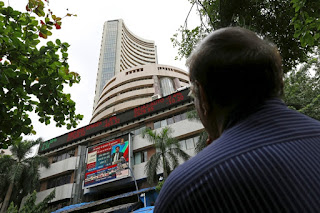Bull run: India now world’s most expensive stock market
 With the markets soaring to record highs yet again on Wednesday, India is now the world’s most expensive market. At a lifetime high of 30,658.77, the benchmark Sensex trades at a price-earnings multiple of nearly 18 times estimated one year forward earnings. India’s market capitalisation hit $2 trillion on Wednesday for the first time ever.
With the markets soaring to record highs yet again on Wednesday, India is now the world’s most expensive market. At a lifetime high of 30,658.77, the benchmark Sensex trades at a price-earnings multiple of nearly 18 times estimated one year forward earnings. India’s market capitalisation hit $2 trillion on Wednesday for the first time ever.
The S&P 500, which closed Tuesday’s session at 2,400.67, is a shade less expensive than India, trading at 17.60 times, while the Japanese Nikkei, at 19,814.88, trades at 17.1 times. Both foreign portfolio investors and domestic institutions have been big buyers of Indian equities in 2017; between January and now, FPIs have pumped in close to $6.8 billion into equities while domestic funds have bought stocks worth $1.82 billion.
Strategists at Macquarie Research observed, the brokerage’s overweight stance on India was not predicated on expectation of an accelerated pay-off from structural reforms or rapidly rising fixed investment and moreover, it continued to view Make in India as a distraction. “Neither is it based on EPS estimates that remain high at 19% or multiples of 17-18 times. We are in India because it is one of the few global and EM economies that is capable of delivering growth and productivity gains with a stable macro outlook and limited external vulnerabilities,” they opined.
While at the start of the current earnings season, the Sensex set of stocks was estimated to report an earnings of Rs 1,682 for FY18 and Rs 1,972 for FY2019, there have been some downgrades. Among the stocks that have seen earnings cuts for FY18 are Bharti Airtel, Ambuja Cements and Infosys. However, there have been some upward revisions as well and there could be more.
Nevertheless, India trades well above its long-term average multiple. Analysts at Bank of America Merrill Lynch pointed out the earnings growth in Q4FY17 would be driven by strong base effects. “The aggregate index earnings are likely to grow 7.1% y-o-y but ex-commodities this PAT growth will grow a measely 2.7% y-o-y. EBITDA margins are likely to decline further,” they wrote.
According to market watchers, while corporate earnings may not have rebounded as fast as earlier anticipated, there is the promise of the government stepping up expenditure in the last two years of its tenure and thereby giving growth a boost. “Government expenditure tends to accelerate over the last two fiscal years led by capital expenditure. Capital goods production tends to pick up sharply in final two years, “strategists at Deutsche Bank wrote recently.
Contact us: - +91-9913158794
Or visit:- http://www.profitstreet.in/
Mail us at:- info@profitstreet.in



Comments
Post a Comment